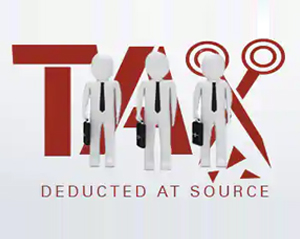Tax Deducted at Source (TDS) and Tax Collected at Source (TCS) are fundamental components of Indian taxation. TDS represents the tax deducted from payments made when the amount exceeds a set limit. Conversely, TCS refers to the tax collected by sellers during transactions with buyers.
Both TDS and TCS operate at the source of income or transaction and are proactive measures to streamline tax administration in the country. Find out more about these two types of tax and the difference between TDS and TCS.
What Is TDS and TCS?
TDS is a mechanism through which the Government collects tax directly at the source of income. This deduction occurs at a specified percentage of the income. Under the provisions of the Income Tax Act, 1961, payers are required to deduct TDS at the source of income if the payment for goods or services exceeds a certain threshold.
The Government of India determines the rates and thresholds for TDS for various categories of goods and services for each financial year. These services may include royalties, technical services, legal fees, consulting fees, rent and more.
TCS is the tax that sellers collect from buyers at the time of sale. It is applicable on the sale of specific goods such as timber, scrap, mineral wood and more, excluding production or manufacturing materials. When a seller sells such goods to a buyer, they collect a certain percentage of tax from the buyer and remit it to the government.
TDS and TCS play vital roles in the Indian taxation system. They ensure the smooth collection of taxes along with promoting compliance among taxpayers and reducing the scope for tax evasion. They also contribute significantly to government revenue and help finance various public services and infrastructure development.
What Is the Difference Between TDS and TCS?
Here’s a comparative analysis of TDS and TCS differences:
| Parameters | TDS | TCS |
|---|---|---|
| Applicable to | TDS is applicable to deductions from payments made for goods and services. | TCS is applicable to the collection of tax by sellers from buyers at the time of sale of specific goods. |
| Transactions covered | TDS covers payments such as rent, salaries, interest and others. | TCS covers the sale of goods such as forest products, minerals and others. |
| Due dates | TDS is required to be deducted by 7th of next month (for March, by 30th April) and paid to the government. TDS returns are filed quarterly. | TCS is deposited monthly within 7 days from the end of the month and quarterly returns are filed. |
| Timing of action | TDS is deducted when payment is made or due, whichever comes earlier. | TCS is collected at the time of sale. |
| Filing requirements | TDS involves filing various forms quarterly (e.g., Form 24Q for salaries). | TCS requires quarterly filing of Form 27EQ. |
| Responsible party | The payer making the payment is responsible for deducting TDS. | The seller conducting the sale is responsible for collecting TCS. |
| Purpose | TDS aims to deduct tax at the source of income. | TCS aims to collect tax at the source of the transaction. |
| Mechanism | TDS is deducted by the payer from the payment to the payee. | TCS is collected by the seller from the buyer at the time of sale. |
TCS rates
| Goods | TCS rates |
|---|---|
| Alcoholic liquor for human consumption | 1% |
| Tendu leaves | 5% |
| Timber obtained under a forest lease | 2.5% |
| Timber obtained by any mode other than a forest lease | 2.5% |
| Any other forest produce (not being timber/tendu leaves) | 2.5% |
| Scrap | 1% |
| Minerals, being coal, lignite or iron ore | 1% |
| Parking lot | 2% |
| Toll plaza | 2% |
| Mining and Quarrying | 2% |
| Purchase of Motor Vehicle exceeding ₹ 10 lakh | 1% |
| Overseas Tour Program Package | 5% |
| Sale of goods of the value or aggregate of such value exceeding ₹ 50 lakh in any previous year, other than the goods being exported out of India or goods covered in sub-section (1) or sub-section (1F) or sub-section (1G) | 0.1% |
COMP/DOC/May/2024/305/6228
People like you also read ...






